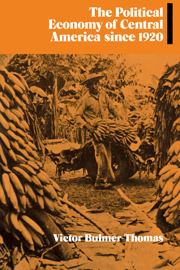Book contents
- Frontmatter
- Contents
- List of figures
- List of tables
- Dedication
- Preface
- List of acronyms
- Table of official exchange rate parities to US dollar
- Map: Central America
- 1 A century of independence: foundations of export-led growth
- 2 Central America in the 1920s: reform and consolidation
- 3 The 1929 depression
- 4 Economic recovery and political reaction in the 1930s
- 5 Central America and the Second World War
- 6 Post-war economic recovery
- 7 The struggle for democracy, the Cold War and the Labour movement in the first post-war decade
- 8 The foundations of modern export-led growth, 1954–60
- 9 The illusion of a golden age, 1960–70
- 10 External shocks and the challenge to the social order, 1970–9
- 11 The descent into regional crisis
- 12 Conclusions
- Methodological Appendix
- Statistical Appendix
- Notes
- Bibliography
- Index
- CAMBRIDGE LATIN AMERICAN STUDIES
12 - Conclusions
Published online by Cambridge University Press: 03 February 2010
- Frontmatter
- Contents
- List of figures
- List of tables
- Dedication
- Preface
- List of acronyms
- Table of official exchange rate parities to US dollar
- Map: Central America
- 1 A century of independence: foundations of export-led growth
- 2 Central America in the 1920s: reform and consolidation
- 3 The 1929 depression
- 4 Economic recovery and political reaction in the 1930s
- 5 Central America and the Second World War
- 6 Post-war economic recovery
- 7 The struggle for democracy, the Cold War and the Labour movement in the first post-war decade
- 8 The foundations of modern export-led growth, 1954–60
- 9 The illusion of a golden age, 1960–70
- 10 External shocks and the challenge to the social order, 1970–9
- 11 The descent into regional crisis
- 12 Conclusions
- Methodological Appendix
- Statistical Appendix
- Notes
- Bibliography
- Index
- CAMBRIDGE LATIN AMERICAN STUDIES
Summary
This chapter brings together the analysis of the previous chapters to summarise the main findings and provide certain conclusions. It will be apparent that some periods lend themselves more easily to conclusions at the regional level than others; in particular the period since 1979 has vastly complicated the Central American reality, shifting the balance between conformity and diversity in the region significantly in favour of the latter. While diversity has always been a feature of Central America – both between countries and within countries – conformity has been generated by the existence (at least until the 1980s) of an economic model which imposed similar options, opportunities and constraints for each republic.
A dominant theme of this chapter is macroeconomic performance, making use of the statistical appendix for the period 1920 to 1984. External conditions have heavily influenced each country's performance, but inter-country differences in growth rates still remain and require explanation. The ranking of the five republics in terms of real Gross Domestic Product (GDP) per head has altered over time and performance has clearly been affected by the policy-mix. ‘Getting policies right’, however, is not just a technical question, but also a political problem requiring the establishment of a minimum consensus.
Central America has pursued since 1920 (and even earlier) an export-led model, but the latter has passed through five phases each of which has carried different implications for economic and social relations.
- Type
- Chapter
- Information
- The Political Economy of Central America since 1920 , pp. 267 - 294Publisher: Cambridge University PressPrint publication year: 1987



